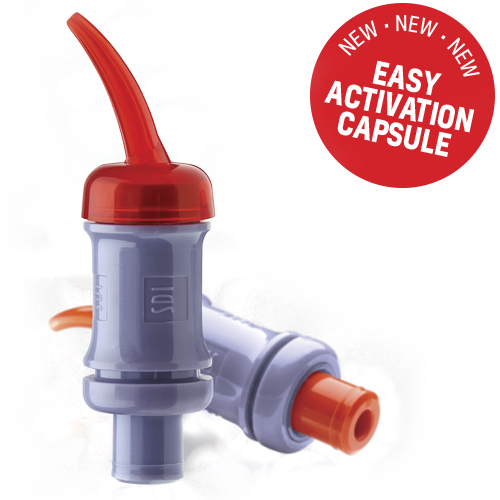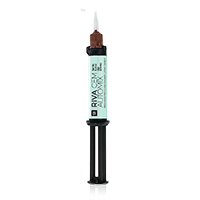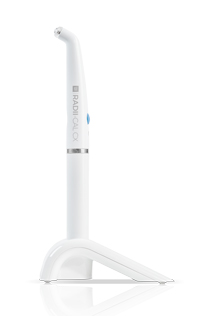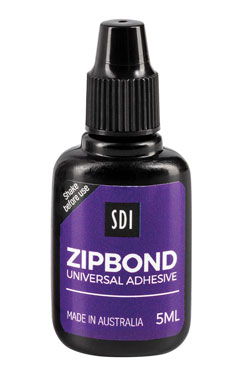Defence against clinical variability
Zipbond Universal is a single component fluoride releasing universal adhesive, compatible with self etch, selective etch and total etch techniques. In the presence of varied tooth structure and an abundance of restorative choices, Zipbond Universal achieves reproducible and reliable bond strengths.

Consistent Bond Strengths
Zipbond Universal achieves successful bond strengths across dentine and enamel using self etch and total etch techniques.
Total etch is considered the best option for enamel only preparations2. Zipbond Universal has minimal fluctuation in bond strength using the total etch technique on enamel, demonstrating the ability to achieve predictable results in each use.
The heterogenous nature of dentine and variability in mineral and water content adds complexity to dentine bonding1. The carefully selected chemistry of Zipbond Universal overcomes the challenges associated with dentine bonding to provide strong and reproducible bond strengths in self etch and total etch techniques.
Select Zipbond Universal for consistent adhesion, predictable clinical outcomes and confidence in the interface between your patients tooth and restoration.
Predictable bond strengths to indirect substrates
Zipbond Universal achieves high bond strengths to composite, ceramic, porcelain and metal substrates. Bond strength across indirect substrates is comparable, highlighting reliable adhesion for these restorative situations. Use Zipbond Universal, together with your preferred indirect restorative material, with confidence.
Shear Bond Strength
Source: SDI Research & Development Department
Proprietary combination of adhesive monomers
Zipbond Universal contains two adhesive monomers that work in harmony to deliver a durable and robust bond. A proprietary combination of monomers, including the MDP monomer, makes adhesion effective on enamel, dentine and a range of indirect substrates.
The adhesive monomers contain hydrophilic and hydrophobic groups. Hydrophilic monomers quickly infiltrate into enamel and dentine tubules. Effective wettability is achieved as the adhesive spreads homogenously over the tooth surface, offering a complete seal of dentine tubules.

Upon curing, the hydrophobic monomers reduce the permeability of water to create a sound interface and strong interaction between tooth and substrate.
Effective hybridisation
The hybrid layer is the main bonding mechanism of adhesive agents1. The adhesive monomers in Zipbond Universal diffuse effectively and evenly into the tooth surface and hybridisation is continuous across the prepared cavity. Dentine tubules are completely sealed in both self etch and total etch techniques, minimising the risk of post-operative sensitivity for the patient.
~Independently tested by Unité de Recherches Biomatériaux Innovants et Interfaces (URB2i-EA 4462 Paris Descartes). Chairman : Dr Jean-Pierre ATTAL
DENTINE WITH ETCHING
– TOTAL ETCH TECHNIQUE~

DENTINE WITHOUT ETCHING
– SELF ETCH TECHNIQUE~

Highly Aesthetic
Controlled Handling
Controlled handling, optimal film thickness and increased bond strength is achieved by the incorporation of inorganic fillers. Zipbond Universal is easy to apply in a homogenous thin layer. Indirect restorations can be seated with precision to deliver an unobstructed seal against the tooth.

inorganic fillers

film thickness
Highly aesthetic
The adhesive is visible upon placement and virtually invisible on dentine after it is cured. It is ideal for use in aesthetic zones with bleach and translucent restorative materials.
Pleasant aroma
Zipbond Universal is mild in its aroma to support your patients comfort during restorative procedures.
Fluoride releasing
‘The primary factor in the premature failure of moderate to large composite restorations is secondary decay at the margins of the restorations’3. Zipbond Universal is fluoride releasing to protect the tooth-restorative interface against demineralisation. An effective marginal seal that fights recurrent decay results in a longer lasting restoration.
Convenient Delivery
Zipbond Universal is available in a bottle. The bottle delivery, drop size is sufficient and the adhesive extrudes easily with no mess.

Key features
- Consistent bond strengths to dentine and enamel
- Proprietary combination of adhesive monomers
- Predictable bond strengths to indirect substrates
- Effective hybridisation
- Exceptional control
- Highly aesthetic
- Pleasant aroma
- Fluoride releasing
- Easy to follow application
- Convenient delivery
* SDI internal data
^ Scotchbond™ Universal, Clearfill™ Universal Bond Quick, Adhese® Universal, Alumina, Lava™ Zirconia, Rexillium III, Wironit, Titanium Grade 1 and MZ100 are not registered trademarks of SDI Limited.
- Eshrak Sofan et al (2017), ‘Classification review of dental adhesive systems: From the IV generation to the universal type’, Annali Di Stomatologia.
- Howard E Strassler et al (2018), ‘Bonding Materials – Reimagining Dental Bonding: predictable restorations for patients.
- Paulette Spencer et al (2010), ‘Adhesive/Dentin Inferface: The Weak Link in the Composite Restoration’, NCBI.







 Central/South America -
Central/South America - 


